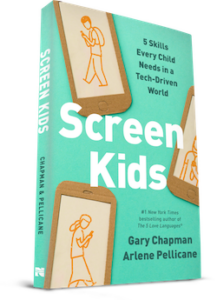Your Daughter’s Shrinking Attention
by Arlene Pellicane
When my children were preschool age, we attended a “mommy and me” music class. The kids and moms got to sit on mats, sing songs, and use different instruments. Yet every week, there would be some child who would start walking around when she was supposed to be sitting still, or a boy who was screaming during singing time. Even with brightly colored scarves and different instruments, the teacher had to work very hard to hold the kids’ attention.
Then when my girls were in elementary school, teachers had to fight hard to keep the attention of their students. It wasn’t getting any easier just because the kids were older.
Today’s tech-laden child is not accustomed to boredom or working quietly. Instead, she is used to constant entertainment and stimulation. The screen world has opened a new door to a fantasy world that is unlike reality. On screens, if something is boring, you can just press a button or swipe your finger to get a new option. Dropdown menus offer something for everyone. Gratification is instant and exciting.
Does real-life work this way? Nope, there’s no magic button to push when you want the school day to end or fast forward (whether school is happening online or in-person). The constant noise of media and video games has stunted a child’s ability to pay attention to anything that isn’t exploding on screen or capturing her interest. Many parents think, “My child doesn’t have an attention problem. She can play on the computer for hours.” Yet when that screen is turned off, that same child is distracted and can’t seem to get her chores or homework completed.
Technology has changed the way we pay attention. When your child visits a favorite website or plays a video game, it’s interactive and consuming. Digital media demands our attention. Television producers and game developers create content that is constantly changing and stimulating. Screen time may hold your child’s attention for hours on end, but will it assist her to pay attention in the most important areas of her life?
Will she have the discipline to finish college and succeed in a career if she wants?
Will she be able to give her full attention to the people in her life, both now and in the future?
Will she be able to grasp deep content, or only skim information without comprehension?
Will she be able to study the Word of God and pray diligently?
The ability to pay attention isn’t just about bringing home good grades in school. It’s also about the ability to look someone you love in the face instead of just staring down at a tablet. Attention has to do with your child’s heart. Children and teens are becoming famous for staring down at screens instead of interacting with the real-life people around them. When you teach your girl to make eye contact with others, you are helping her focus their attention at the person at hand. This helps her become more empathetic and healthier in her relationships.
So, the next time you come home and you’re greeted by the top of your child’s head (since she is staring at a video game), tap your child on the head and gently turn her face towards yours. Say “It’s nice to see you” and insist on having your eyes meet. Later on in the evening, you can say something like, “When I come home, I’m always happy to see you. Please put your device down when I come in the room and look at me. That’s how you show others you care.”
In this digital age, so many things are fighting for the attention of your child. Playing a game on the tablet. Watching that new video. Texting a friend. It’s up to you to help your children turn off devices more often and tune into the things (and people) in life that really matter. Activities such as reading books, playing outside, and having restful, screen-free downtime can help a girl strengthen her attention span. When a child can bring her wandering attention under control, it will give her great advantages in her future career, life, and love.
RELATED RESOURCES
In this digital age, children spend more time interacting with screens and less time playing outside. It’s time to take your kids back from screen enchantment.
In Screen Kids, Gary Chapman and Arlene Pellicane will empower you with the tools you need to make positive changes. Through stories, science, and wisdom, you’ll discover how to take back your home from an overdependence on screens. Plus, you’ll learn to teach the five A+ skills that every child needs to master: affection, appreciation, anger management, apology, and attention.

MEET ARLENE
 Arlene Pellicane is a speaker, podcaster, and author of several books including Screen Kids and Grandparenting Screen Kids (co-authored with Dr. Gary Chapman). Learn more at ScreenKidsbook.com. Arlene loves helping people create happy homes to the glory of God. You can connect with Arlene on her website.
Arlene Pellicane is a speaker, podcaster, and author of several books including Screen Kids and Grandparenting Screen Kids (co-authored with Dr. Gary Chapman). Learn more at ScreenKidsbook.com. Arlene loves helping people create happy homes to the glory of God. You can connect with Arlene on her website.
© 2020 by Arlene Pellicane. All rights reserved.